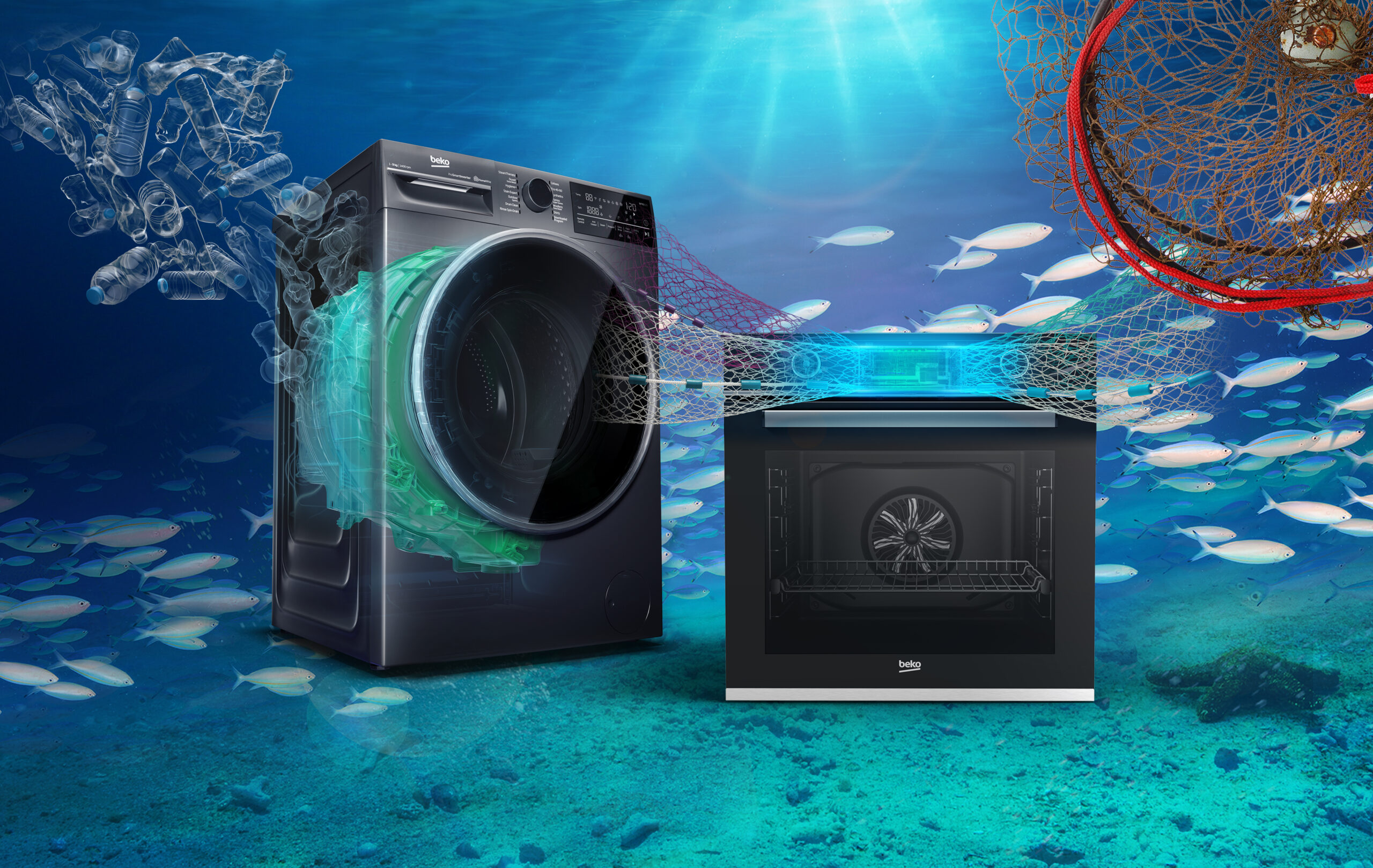Initiatives and Case Studies

Beko’s Recycled Content
Beko has maintained its commitment to the environment in 2024 through a renewed focus on reducing its carbon footprint but also by continuing to implement circular practices aimed at minimizing the use of virgin materials. Showcasing innovative ways to incorporate recycled content into their products, Beko has worked with their suppliers to transform plastic materials like used fishing nets, industrial thread waste or plastic bottles into recycled materials that have then gone into the production of high-performance appliance parts.
Member Initiative / Producer / Fridge & Freezers / Other Large Equipment / Reduce / Rethink / Reuse
Key Findings
- Beko’s R &D departments have developed high-performance, recycled plastic formulations to replace their virgin counterparts without sacrificing the durability of components or products.
- Beko incorporates recycled fishing nets, industrial thread waste, recycled plastic bottles and other types of recycled plastic into their essential, every day, household products such as ovens, washing machines and dishwashers to name a few.
- Beko has a target to achieve 40% recycled plastic content in their products, on a global level, by 2030.
- Beko has committed to becoming Net Zero by 2050 and has also set near term Science Based Targets to reduce emissions by 42% in Scope 1, 2 and 3 (product use) by 2030 (from a 2022 base) *.

Beko's Recycled Plastics Data Globally by Type (2023)
| Recycled waste PET bottles | 75.3 million units |
| Recycled waste fishnets | 10 tonnes |
| Recycled industrial thread waste | 348 tonnes |
| Recycled plastic obtained from Arcelik's WEEE Recycling plants | 1.3 tonnes |
| Recycled plastics in SDAs only | 707 tonnes |
| Compounding recycled graphene | 2.2 tonnes |
Summary
Established in 1955, Beko is one of Europe’s leading household appliance manufacturers with a global workforce of over 55,000 people in more than 45 countries, distributing products and services to 130+ countries.
Many of the appliances produced by Beko now feature parts made from recycled fishing nets, industrial thread waste, and recycled plastic bottles. By transforming recycled materials into high performance appliance parts, Beko are striving to reduce their products’ embedded carbon footprint and reduce the reliance on virgin materials.
Using patented technology, PET flakes obtained through the recycling of PET bottles have replaced up to 10% of the polypropylene and fiberglass materials normally used in the washing machine and washer dryer tubs. The newly created material maintains the structural properties necessary for a component operating under such harsh conditions, thus maintaining the sturdiness of the tubs and the longevity of the appliances, while reducing the embedded carbon emissions.
When it comes to ovens and dishwashers, some of the recycled plastic that has gone into the production of certain parts has come from recycling industrial thread waste and old fishing nets. This prevents them from entering our oceans.
These are just a few of the innovative solutions Beko has used to increase the recycled plastic content of their products, which in 2023 has reached 10% of the total plastic used in its own production facilities for the manufacturing of MDA and TV appliances. This is in line with the 2030 global target of reaching 40% recycled plastic content.
The developments in technology have allowed Beko to make progress in reducing the embedded carbon footprint of their products, on a global level. This included using 16,543 tonnes of recycled plastic in the products produced in their manufacturing plants in 2023.
Beko’s initiatives related to increasing recyclability and using recycled materials alongside other important actions like investing in energy efficiency and renewable energy projects as well as a continued focus on selling more energy efficient appliances are important actions that Beko is taking, that are aimed at reducing its impact on the environment, on a global level.
Beko's Products' Recyclability
| Washing machine | 99% |
| Condenser Tumble Dryers | 98% |
| Refrigerators | 99% |
| Dishwashers | 84% |
| Electronic Devices | 88-92% |
| Ovens | 91% |
For More Information
For more information, please visit https://www.bekocorporate.com/sustainability-report-2023/overview
*Beko (under trading name Arcelik) already has approved Science Based Targets in line with the Paris Agreement’s goal of limiting global temperature increase to “well-below 2°C”. These are a reduction in the Scope 1 and 2 emissions by 30% and in Scope 3 emissions from the use of sold products by 15% by 2030, compared to 2018 baseline. In addition to the approved SBTs, in 2024 Beko has submitted the company’s updated SBTs which are in line with 1.5°C and aiming to reduce the Scope 1 and 2 and the Scope 3 emissions from the use of sold products by 42% by 2030, from a 2022 baseline.
